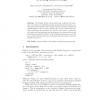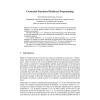133 search results - page 9 / 27 » Benchmarking Implementations of Lazy Functional Languages |
PADL
2007
Springer
14 years 1 months ago
2007
Springer
Abstract The Haskell String type is notoriously inefficient. We introduce a new data type, ByteString, based on lazy lists of byte arrays, combining the speed benefits of strict a...
GI
2009
Springer
14 years 9 days ago
2009
Springer
: In this paper we present the concurrent constraint functional programming CCFL and an abstract machine for the evaluation of CCFL programs in a multicore environment. The source ...
ENTCS
2007
13 years 7 months ago
2007
The tracer Hat records in a detailed trace the computation of a program written in the lazy functional language Haskell. The trace can then be viewed in various ways to support pr...
SAS
1994
Springer
13 years 11 months ago
1994
Springer
Strictness analysis has been a living field of investigation since Mycroft's original work in 1980, and is getting increasingly significant with the still wider use of lazy fu...
CORR
2006
Springer
13 years 7 months ago
2006
Springer
Packrat parsing is a novel technique for implementing parsers in a lazy functional programming language. A packrat parser provides the power and flexibility of top-down parsing wi...


